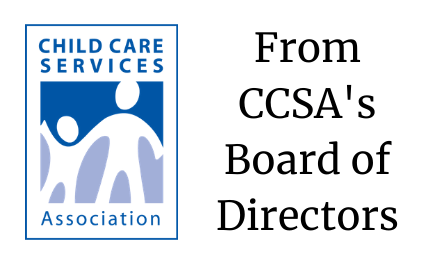We are writing at this time to convey our concerns about SB570, the Hold Harmless Star Ratings bill.
Child Care Services Association (CCSA), headquartered in the Triangle, leads efforts to strengthen accessible and affordable quality child care for all families through research, services and advocacy locally, regionally and nationally. We have extensive experience related to the workforce, providing educational scholarships and salary supplements to child care professionals through the T.E.A.C.H. Early Childhood®, Child Care WAGE$® and Infant Toddler Educator AWARD$® Plus programs. For nearly 30 years, we have studied N.C.’s early childhood system and workforce, including research on compensation, working conditions, education, turnover, supply and demand and more.
CCSA’s Board of Directors is a diverse group of volunteers. One-third of CCSA’s board members are recipients of services, one-third are experts and one-third are members at large. For 47 years, CCSA’s board has supported systematic efforts affecting early care and education, including a strong QRIS system that supports child care programs in achieving and maintaining quality.
A critical factor in program quality is educated teachers. The T.E.A.C.H. Early Childhood® Scholarship Program, established in 1990, addresses the needs of N.C.’s early care (EC) and education workforce for increased education, compensation and retention. This program has helped more than 30,000 people access the state’s higher education system, supporting them as they earn degrees and receive compensation awards; it also improves stability for young children by requiring participant retention in the EC field.
N.C. faces an unprecedented child care workforce shortage. This shortage has been building for years, and it was exacerbated by COVID-19. Child care programs stayed open and EC educators have been on the frontlines as essential workers, risking their own health and working for exceedingly low wages, averaging $12/hr. even for educators with degrees. Low compensation is the number one reason EC educators leave the field and will not return to child care classrooms as programs begin to reopen and expand to serve a growing demand for their services as parents return to work.
We appreciate your leadership in recognizing that N.C.’s child care system requires review at this time, and we support the primary provision of Senate Bill 570, Section 1, to allow programs to maintain their star rating when faced with the challenging job of finding and hiring qualified staff. No child care program should be penalized at this time for not maintaining their star rating because of the workforce shortage, and this bill allows for a hold harmless period of time.
However, Sections 2 and 3 are not necessary, and they will not alleviate the child care workforce crisis. Instead, this bill has negative ramifications for children, parents, educators and N.C.’s health and well-being.
It ignores the science of what young children need for healthy development and early learning. Brains are built, not born. Child care educators need education and experience to know about child development and early education, so children in all areas of the state, especially in rural areas where there are fewer options, have the early learning experiences necessary to prepare them to succeed. It also demeans educators who have worked hard to obtain the appropriate educational degrees for their jobs. More than 60% of our workforce already has an associate degree or higher.
The Bill, as currently proposed, undermines parents’ ability to make informed choices for their children. Parents rely on the star rating system to understand the quality of the programs they choose for their children. Parents want to trust that a 4- or 5-star license means their children are receiving a high-quality early education with educators who will help ensure their child’s healthy development and early learning.
The Bill also will not prevent members of the child care workforce from leaving the field. The pandemic has driven up wages in other businesses that compete for workers without specialized training or education. Child care businesses operate on thin margins and cannot keep up with giant corporate employers like Walmart and Target. Lowering standards drives down pay, attracting a less educated workforce.
We have a historic opportunity to support recovery from the pandemic, address the EC educator shortage and keep the quality standards that best prepare our young children for success in school.
We, the Board of Directors of Child Care Services Association, encourage you to consider the implications of this bill for N.C’s children, parents and educators. It sets N.C. back decades. Child care is necessary for families to be able to work, and quality child care is critical for children to prepare for school. If done well, high quality child care benefits us all.
Thank you for your service to our state’s children and families and the early education system.
Child Care Services Association (CCSA) Board of Directors
| Peggy Ball, Chair Early Childhood Consultant | Dan Hudgins, Vice Chair Retired, UNC-Chapel Hill | Kimberly Shaw, Secretary A Safe Place Childcare |
| Michele Miller-Cox, Assistant Secretary First Presbyterian Day School | Richard Burton, Treasurer Retired, Duke University | Sharon Hirsch, Assistant Treasurer Prevent Child Abuse NC |
| Jo Abernathy, Assistant Treasurer Blue Cross Blue Shield NC | Jennifer Lacewell, Member White Rock Child Development Center | Chris Willett, Member Beemer, Hadler & Willett, PA |
| Adriana Martinez, Member Spanish for Fun Academy | Adam Zolotor, Member UNC Family Medicine | Michael Palmer, Member Retired, Self-Help Credit Union |
| Renee Price, Member Orange County Commissioner | Christopher Ratte, Member F&M Bank | Harold G. Sellars, Member Retired, Mechanics & Farmers Bank |
| Barker French, Member Retired Investment Advisor | Aleksandra Holod, Member American Institute for Research | Ex-officio Marsha Basloe, CCSA President |
Appendix: Recommendations for Sections 2 and 3 of SB570
We can address the long-standing early childhood teacher shortage issue in better ways that get at the real underlying problems and keep quality standards in place that protect children and get them ready for school success by:
- Immediately address teacher recruitment and retention and reduce barriers to meeting requirements:
- Allow six months, up from 120 days, to replace a position with a qualified candidate for 12 months after the State of Emergency ends.
- Create signing and six-month retention bonuses for degreed teachers for the next two years using existing ARPA funding dedicated for child care.
- Provide child care stabilization grants that child care businesses can use to support short-term hiring and retention strategies over the next two years using existing ARAP funding dedicated for child care.
- Increase the early childhood teacher pipeline over the next three years:
- Expand high school Early Childhood Career and Technical Pathways programs across the state.
- Design a new course that will award college credit towards a degree in early childhood based on work experience.
- Design a new course that will award college credit for taking online health, safety and nutrition training modules.
- Create a fast-track certificate program for the Early Childhood and Infant Toddler Certificates that would reduce the time to complete a certificate from four semesters to one or two semesters and fund cost of certificate through existing T.E.A.C.H. Early Childhood® Scholarships that pay for college tuition for the early childhood workforce.
- Create the T.E.A.C.H. Early Childhood® Apprenticeship Program to expand educational options for the early learning workforce in N.C. and across the U.S. by becoming a National Registered Apprenticeship with the U.S. Dept. of Labor, helping educators obtain the skills they need to maximize children’s learning and development and connect apprenticeship programs with compensation reform.
- Expand Child Care WAGE$® statewide (currently in 58 counties), which provides salary supplements to teachers working toward degrees in early childhood.
- Increase subsidy market rates from the 2015 to 2018 rates.



